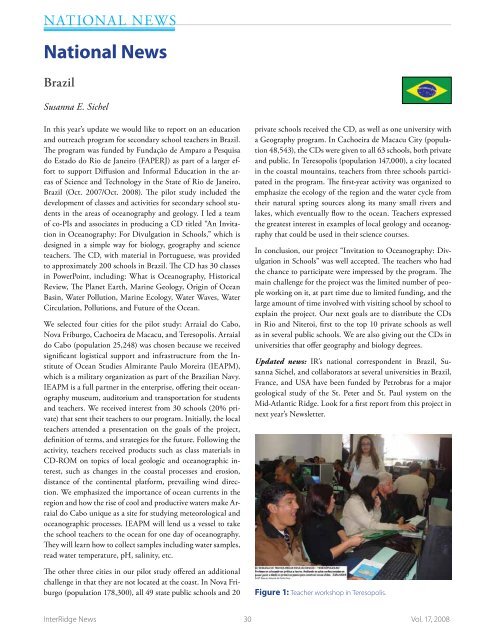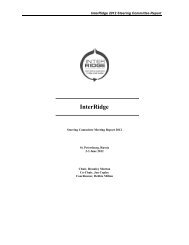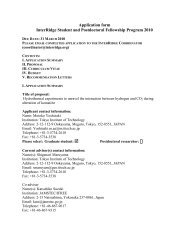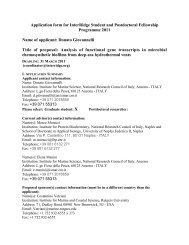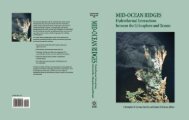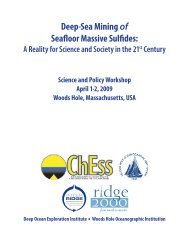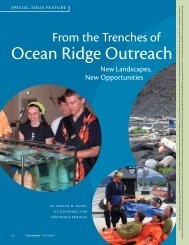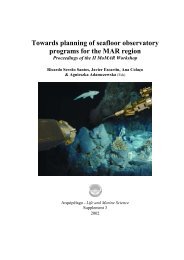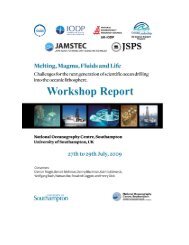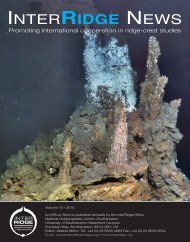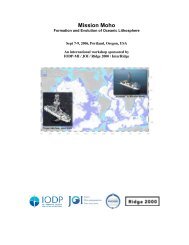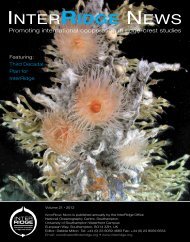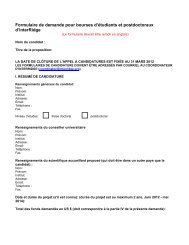Full version, lower resolution, 3.25MB - InterRidge
Full version, lower resolution, 3.25MB - InterRidge
Full version, lower resolution, 3.25MB - InterRidge
You also want an ePaper? Increase the reach of your titles
YUMPU automatically turns print PDFs into web optimized ePapers that Google loves.
National News<br />
National News<br />
Brazil<br />
Susanna E. Sichel<br />
In this year’s update we would like to report on an education<br />
and outreach program for secondary school teachers in Brazil.<br />
The program was funded by Fundaçâo de Amparo a Pesquisa<br />
do Estado do Rio de Janeiro (FAPERJ) as part of a larger effort<br />
to support Diffusion and Informal Education in the areas<br />
of Science and Technology in the State of Rio de Janeiro,<br />
Brazil (Oct. 2007/Oct. 2008). The pilot study included the<br />
development of classes and activities for secondary school students<br />
in the areas of oceanography and geology. I led a team<br />
of co-PIs and associates in producing a CD titled “An Invitation<br />
in Oceanography: For Divulgation in Schools,” which is<br />
designed in a simple way for biology, geography and science<br />
teachers. The CD, with material in Portuguese, was provided<br />
to approximately 200 schools in Brazil. The CD has 30 classes<br />
in PowerPoint, including: What is Oceanography, Historical<br />
Review, The Planet Earth, Marine Geology, Origin of Ocean<br />
Basin, Water Pollution, Marine Ecology, Water Waves, Water<br />
Circulation, Pollutions, and Future of the Ocean.<br />
We selected four cities for the pilot study: Arraial do Cabo,<br />
Nova Friburgo, Cachoeira de Macacu, and Teresopolis. Arraial<br />
do Cabo (population 25,248) was chosen because we received<br />
significant logistical support and infrastructure from the Institute<br />
of Ocean Studies Almirante Paulo Moreira (IEAPM),<br />
which is a military organization as part of the Brazilian Navy.<br />
IEAPM is a full partner in the enterprise, offering their oceanography<br />
museum, auditorium and transportation for students<br />
and teachers. We received interest from 30 schools (20% private)<br />
that sent their teachers to our program. Initially, the local<br />
teachers attended a presentation on the goals of the project,<br />
definition of terms, and strategies for the future. Following the<br />
activity, teachers received products such as class materials in<br />
CD-ROM on topics of local geologic and oceanographic interest,<br />
such as changes in the coastal processes and erosion,<br />
distance of the continental platform, prevailing wind direction.<br />
We emphasized the importance of ocean currents in the<br />
region and how the rise of cool and productive waters make Arraial<br />
do Cabo unique as a site for studying meteorological and<br />
oceanographic processes. IEAPM will lend us a vessel to take<br />
the school teachers to the ocean for one day of oceanography.<br />
They will learn how to collect samples including water samples,<br />
read water temperature, pH, salinity, etc.<br />
The other three cities in our pilot study offered an additional<br />
challenge in that they are not located at the coast. In Nova Friburgo<br />
(population 178,300), all 49 state public schools and 20<br />
private schools received the CD, as well as one university with<br />
a Geography program. In Cachoeira de Macacu City (population<br />
48,543), the CDs were given to all 63 schools, both private<br />
and public. In Teresopolis (population 147,000), a city located<br />
in the coastal mountains, teachers from three schools participated<br />
in the program. The first-year activity was organized to<br />
emphasize the ecology of the region and the water cycle from<br />
their natural spring sources along its many small rivers and<br />
lakes, which eventually flow to the ocean. Teachers expressed<br />
the greatest interest in examples of local geology and oceanography<br />
that could be used in their science courses.<br />
In conclusion, our project “Invitation to Oceanography: Divulgation<br />
in Schools” was well accepted. The teachers who had<br />
the chance to participate were impressed by the program. The<br />
main challenge for the project was the limited number of people<br />
working on it, at part time due to limited funding, and the<br />
large amount of time involved with visiting school by school to<br />
explain the project. Our next goals are to distribute the CDs<br />
in Rio and Niteroi, first to the top 10 private schools as well<br />
as in several public schools. We are also giving out the CDs in<br />
universities that offer geography and biology degrees.<br />
Updated news: IR’s national correspondent in Brazil, Susanna<br />
Sichel, and collaborators at several universities in Brazil,<br />
France, and USA have been funded by Petrobras for a major<br />
geological study of the St. Peter and St. Paul system on the<br />
Mid-Atlantic Ridge. Look for a first report from this project in<br />
next year’s Newsletter.<br />
Figure 1: Teacher workshop in Teresopolis.<br />
<strong>InterRidge</strong> News 30 Vol. 17, 2008


